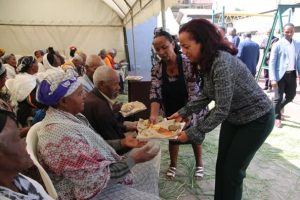
It is an agreed fact that the role of rural women in national development is huge and unparalleled. Rural women play an irreplaceable role in increasing agricultural productivity and food production, reducing the level of rural poverty, and shaping families.
In many parts of the world, rural women have manifold roles and they are the backbone of their families and communities. Ranging from providing care and support to their respective families to food production engaging in agricultural works, at household and family management, the role of women in bringing social changes and rural development is beyond words.
However, even if their role in the overall development of any society is enormous and inimitable, rural women always face a number of challenges, including access to education, finance, healthcare services, and technology, that hinder them from realizing their full potential.
However, recognizing the irreplaceable role of rural women in development, various measures have been taken to address the challenges they face, unlock their potential, empower them, and enhance their presence and participation in each and every activity of their respective countries.
To this effect, and to give recognition for the critical role and contribution of rural women, and their endeavors for national development, the global community commemorates the ‘International Day’ of Rural Women (IDRW) every year on October 15.
This year’s ‘International Day’ of Rural Women’ was also observed on October 15 across the world under the theme “Rural Women Sustaining Nature for Our Collective Future: Building Climate Resilience, Conserving Biodiversity, and Caring for land towards gender equality and Empowerment of women and girls.”
The day was also marked here in Addis Ababa at the African Union Hall under the theme ‘Empowering rural women through accessing education and technology.’
Speaking on the occasion, Women and Social Affairs Minister Ergogie Tesfaye (PhD) said that empowering rural women in education technology is of critical importance to unleash the potential of women.
According to the Minister, among the many challenges that test rural women, the provision of land and finance, and access to education and technology are the major ones.
Rural women, though encountering several challenges, are playing a decisive role in the effort exerted to ensure food security at the household level.
Several activities are being done to improve the lives of rural women by expanding access to education and technology so that women can be successful in the area they are engaged in.
Legal and operational systems that enable rural women to have access to land ownership and finance and benefit them are being developed and implemented.
What is more, women who are vulnerable to man-made and natural disasters are being supported in various ways to enable them to lead a better life, the Minister added.
According to her, addressing the challenges of rural women and empowering rural women through education and technology can unlock their full potential, improve their livelihoods, and create lasting positive impacts not only at the household but also at national and continental levels.
Commissioner for Agriculture, Rural Development, Blue Economy and Sustainable Environment (ARBE) of the African Union Amb. Josefa Sacko, on his part, said that women are the backbone of African agriculture. Thus, empowering rural women is a shared responsibility.
According to the Commissioner, accessing quality education and expanding technology for rural women is not something that we can postpone for tomorrow. It is an urgent matter that we have to work committedly to improve the lives of African rural women.
“Rural women should be supported in the area of agriculture in a manner they can produce products that will benefit them economically, beyond family level,” the Commissioner added. The Commissioner also urged the member countries of the Union to work together to ensure the sustainable food security of the continent.
According to a statement issued by the World Health Organization in relation to the International Day for Rural Women, rural women account for about 22 percent of the global population. Women play an important role in the health and well-being of their communities.
However, rural women can face challenges like higher rates of poverty (as both extreme and multidimensional poverty are higher in rural areas globally), as well as unequal access to education, health and other social services, and employment opportunities. They can also experience gender inequality resulting from discriminatory social institutions, formal and informal laws, social norms, and practices. Challenges can be even greater for rural Indigenous women and girls.
Despite these challenges, rural women are a driving force in improving the health and well-being of their communities. They have key roles in ensuring food production, security, and nutrition for communities in both rural and urban areas.
They also play a crucial role in conserving and cultivating biodiversity, being custodians of natural resources and traditional knowledge.
Rural women are central actors in rural health and care systems. Women globally make up 67 percent of the healthcare workforce and an estimated 70 percent of community healthcare workers. Community healthcare workers are often the only healthcare workers that rural people can access. Many community healthcare workers are not paid a fair wage. Rural women provide unpaid care work, taking care of children and the elderly.
Rural women also have roles in other domains essential for health, such as water and sanitation services, zoonosis control, and occupational health, among others.
This year’s theme, “Rural Women Sustaining Nature for Our Collective Future: Building Climate Resilience, conserving biodiversity, and Caring for land towards gender equality and Empowerment,” highlights the pivotal role rural women play. “On International Day of Rural Women (15 October 2024), we honor their contributions as agents of health and empowerment in their communities, working towards a more sustainable and equitable future for all,” the statement added.
Empowering rural women through education and technology is critical to the economic and social development of families, communities, and countries. To this effect, enhancing access to quality education and modern technologies; and ensuring that rural women are benefiting from the opportunities are central.
The first International Day of Rural Women was celebrated on 15 October 1995, to honor rural women’s critical role in feeding the world.”
BY STAFF REPORTER
THE ETHIOPIAN HERALD THURSDAY 21 NOVEMBER 2024





